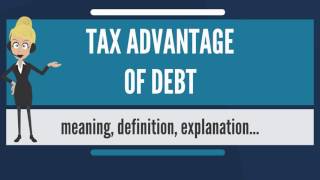 < iframe width="480" height="320" src="https://www.youtube.com/embed/AsvCSLIVcq8?rel=0" frameborder="0" allowfullscreen >< img style="float: left; margin:0 5px 5px 0;" src="https://ustaxreview.org/wp-content/uploads/2021/04/2TOX7L.jpg"/ > ✪ ✪ ✪ ✪ ✪ http://www.theaudiopedia.com ✪ ✪ ✪ ✪ ✪.What is TAX BENEFIT OF DEBT? What does TAX ADVANTAGE OF FINANCIAL OBLIGATION mean? TAX BENEFITS OF FINANCIAL OBLIGATION meaning - TAX ADVANTAGE OF FINANCIAL OBLIGATION meaning - TAX BENEFIT OF FINANCIAL OBLIGATION description.Source: Wikipedia.org article, adapted under https://creativecommons.org/licenses/by-sa/3.0/ license.In the context of business finance, the tax advantages of debt or tax advantage of financial obligation describes the fact that from a tax viewpoint it is cheaper for companies and investors to fund with debt than with equity. Under a majority of tax systems around the world, and up until recently under the United States tax system, firms are taxed on their profits and people are taxed on their personal earnings.For example, a firm that earns $100 in earnings in the United States would need to pay around $30 in taxes. If it then distributes these profits to its owners as dividends, then the owners in turn pay taxes on this income, say $20 on the $70 of dividends. The $100 of earnings turned into $50 of investor income.If, rather the firm financial resources with financial obligation, then, assuming the company owes $100 of interest to investors, its revenues are now 0. Investors now pay taxes on their interest earnings, say $30. This suggests for $100 of revenues before taxes, financiers got $70.This tax-related motivation of financial obligation funding has not gone uncriticized. For example, some critics have actually argued that the expense of equity should also be deductible; which might lower the Internal Revenue Code's influence on capital-structure decisions, possibly lowering the financial instability attributable to extreme financial obligation funding.
< iframe width="480" height="320" src="https://www.youtube.com/embed/AsvCSLIVcq8?rel=0" frameborder="0" allowfullscreen >< img style="float: left; margin:0 5px 5px 0;" src="https://ustaxreview.org/wp-content/uploads/2021/04/2TOX7L.jpg"/ > ✪ ✪ ✪ ✪ ✪ http://www.theaudiopedia.com ✪ ✪ ✪ ✪ ✪.What is TAX BENEFIT OF DEBT? What does TAX ADVANTAGE OF FINANCIAL OBLIGATION mean? TAX BENEFITS OF FINANCIAL OBLIGATION meaning - TAX ADVANTAGE OF FINANCIAL OBLIGATION meaning - TAX BENEFIT OF FINANCIAL OBLIGATION description.Source: Wikipedia.org article, adapted under https://creativecommons.org/licenses/by-sa/3.0/ license.In the context of business finance, the tax advantages of debt or tax advantage of financial obligation describes the fact that from a tax viewpoint it is cheaper for companies and investors to fund with debt than with equity. Under a majority of tax systems around the world, and up until recently under the United States tax system, firms are taxed on their profits and people are taxed on their personal earnings.For example, a firm that earns $100 in earnings in the United States would need to pay around $30 in taxes. If it then distributes these profits to its owners as dividends, then the owners in turn pay taxes on this income, say $20 on the $70 of dividends. The $100 of earnings turned into $50 of investor income.If, rather the firm financial resources with financial obligation, then, assuming the company owes $100 of interest to investors, its revenues are now 0. Investors now pay taxes on their interest earnings, say $30. This suggests for $100 of revenues before taxes, financiers got $70.This tax-related motivation of financial obligation funding has not gone uncriticized. For example, some critics have actually argued that the expense of equity should also be deductible; which might lower the Internal Revenue Code's influence on capital-structure decisions, possibly lowering the financial instability attributable to extreme financial obligation funding.
What is TAX ADVANTAGE OF DEBT? What does TAX ADVANTAGE OF DEBT mean? TAX ADVANTAGE OF DEBT meaning

What is TAX BENEFIT OF FINANCIAL OBLIGATION? What does TAX ADVANTAGE OF DEBT suggest? TAX ADVANTAGE OF DEBT meaning
Category :
Tax Lawyer News